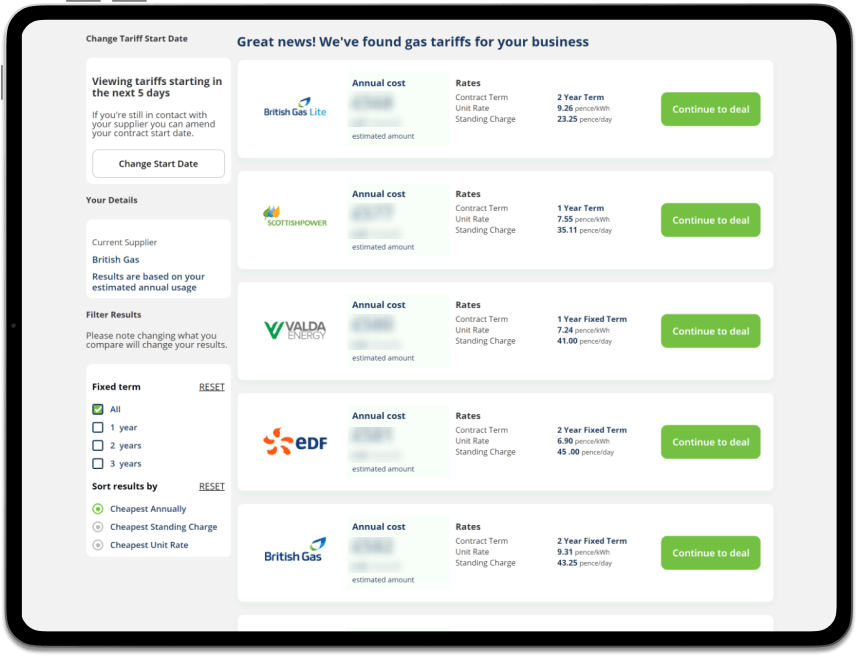Compare Business Energy
Compare business energy quotes in 30 seconds and select the best deal from our trusted panel.






Why Compare Business Energy?
Staying with your current business energy supplier may seem like the easier option, and you may even receive a cheaper quote than your previous contract on your renewal. However, many business owners are unaware that they could save even more. Compare your business energy in just 30 seconds to see if you could save more.
Why Switch Business Energy With Us?
We're here to help you save on your business energy. When switching with us, you have the unique option of completing your business energy switch fully online. You can secure your new business energy deal without the need for a 40 minute phone call.
17 yrs
Providing exceptional service and expertise
500k+
Businesses have saved with us
£150M+
Total savings on bills for our customers

Rated excellent by our customers
Small Business Energy Quotes
Many business owners struggle to find spare time to compare business energy, as it often falls low on the priority list. However, a couple of minutes out of your day can save you a significant amount of money. Even when you think you have a great deal on your renewal, there could be a better one available.
A typical small business in the UK uses around 10,000kWh of electricity and 2,500kWh of gas. In December 2025, the average price would be £3,149.45 per year for both fuels. This calculation is based on a unit rate of 8.4p for gas and 26.5p for electricity. The daily standing charge has also been included in this calculation.
Large Business Energy Quotes
Larger businesses are typically offered cheaper quotes per unit as they purchase larger amounts. However, the same applies to larger businesses in that business energy is often lower down on the priority list. Even when you think you have a great deal on your renewal, there could be a better one available.
A typical large business in the UK uses around 37,500kWh of electricity and 20,00kWh of gas. In December 2025, the average price would be £11,824.07 per year for both fuels. This calculation is based on a unit rate of 7p for gas and 26.1p for electricity. The daily standing charge has also been included in this calculation.
Small Business Energy Funding - Cut Energy Bills
Small businesses in the UK can now access new Government funding to reduce their energy bills. The funding targets lowering running costs by investing in energy-saving technology, such as installing energy-efficient heating systems, better insulation, solar panels, and technology that helps track usage.
Why This Matters for Your Business
There’s £2 million available for UK small businesses delivered through the Made Smarter Adoption Programme after a report found that 67% of small businesses that installed solar panels or adopted more sustainable practices reported reduced energy costs.
Imagine the savings of switching your business energy now and securing the funding to further reduce your bills. Check eligibility for funding.
Compare Business Energy Tariffs
There’s tariffs to suit every type of business and here’s a breakdown to help you decide the best one for your business.
|
Fixed-Rate |
Unit price remains the same for the agreed contract length | Predictable billing, protection from price changes | Locked-in to a deal for the agreed time | Businesses that want stability and easy budgeting |
|---|---|---|---|---|
|
Variable |
Prices change inline with wholesale market | Flexible | Unpredictable billing, no price cap for businesses | Businesses ok with risk and short-term arrangements |
|
Deemed/ Out-of-Contract |
Automatically applied if you have not agreed a new deal | No commitment | Often the highest rates on the market | Only suitable if you’re moving premises |
|
Green/ Renewable |
Energy matched with renewable generation sources | Great for the environment and carbon footprint | Sometimes slightly higher rates but not always | Sustainably driven businesses |
|
Half-Hourly Meter Tariff |
Usage data is submitted every 30 minutes (electricity only) | Accurate billing with no surprises | Requires specific meter | Medium to large businesses |
Business Energy Renewal Explained
When your business energy renewal from your supplier arrives, you may be happy to accept it. If the quote is lower than your last contract, why switch? The truth is that you could still secure a cheaper quote. Suppliers will often offer you a renewal quote slightly cheaper than your last contract to ensure you stay a customer, potentially missing out on extra savings from a simple 30-second comparison.
FREE Standing Charge
No Standing Charge Business Energy Contracts Available
£0.00 standing charge available on select tariffs
Business Energy FAQs
-
What Do I Need To Know Before I Switch?
Decided it's time to switch? Here are some tips:
Having the right information to hand when you come to switch business energy providers is essential to receiving an accurate quote. There are some other things you should be considering too. For a seamless switching process, even if you're just reviewing the latest energy rates, consider these steps:
1. Locate meter registration numbers
When you compare business energy quotes, having your Meter Point Reference Number and Meter Point Administration Number (MPRN & MPAN) to hand will ensure you're getting accurate rates based on actual usage. These numbers should be displayed on a recent energy bill.
When you compare business energy quotes with Love Energy Savings, all you need to do is enter your postcode and select your address. Our comparison engine can then find your meter and provide the latest prices for your business. It couldn’t be simpler!
2. Your company information
You'll need some basic company information so our business energy experts can find you a great deal. Switching can be completed completely online at a time that suits you, or our team are just a phone call away should you need any assistance.
We'll typically need the following information:
- Business address and postcode
- When you would like your new energy deal to start
- Energy meter numbers
- How much energy do you consume annually
Most of the information you need will be on your recent bill.
3. Switch with confidence
There's no obligation to switch business energy providers with us. We want you to find the right deal for you. If you decide to switch with us, you can sit back and relax whilst we handle the process for you.
4. Remember rates change every day
The energy market can be highly volatile and multiple factors can impact the price you pay for your energy usage. Here are some reasons you could be paying more or less for your commercial energy contract:
- The size of your business - larger consumption businesses pay more annually for their energy usage but will get discounted unit rates. Businesses with lower consumption will pay higher unit rates.
- Your energy tariff - there's a wide range of tariffs that have different price models - for example, Economy 7/ 10 (cheaper rates at night), no standing charge tariffs and green energy tariffs will all pay different rates. Each one has its benefits depending on how your company uses gas and electricity.
- Energy suppliers - whilst generally guided by wholesale market prices, different suppliers will have different pricing models making some more expensive than others.
- Wholesale market prices - the wholesale market is always changing, and suppliers will use this as a guideline for their pricing models. Significant world events, weather and other factors can impact the wholesale market, and the prices will be adjusted accordingly.
-
Can I Switch Business Energy With Multiple Buildings?
If you run a business with high energy usage or multiple locations, you may choose to install a multi-site meter.
This allows businesses with multiple premises or high usage to manage their energy with one contract. Your multi-site business energy contract covers the billing for more than one meter, whether at a single premise or multiple locations.
Some of the benefits of a multi-site meter are:
- Greater management over multiple sites– Whether your business has 2 or 10 locations, a multi-site meter could help you manage your energy more effectively. This makes matters such as renewals easier to deal with.
- Better management for single large sites– Instead of having several meters on one site, you could get a multi-meter that will cover your whole premises.
- Further discounts may be available– You can leverage your buying power and get larger discounts when choosing a multi-site meter.
-
Why is My Business Energy Contract End Date Important?
Your contract end date is important because it tells you when you can terminate your current contract and switch to a new deal.
If you fail to organise a contract renewal, termination or supplier switch before your contract ends, you could be placed on expensive out-of-contract rates or even be rolled over onto another contract for another term. Once your contract has been rolled over, it can be difficult to get out of it.
Many businesses face unnecessarily expensive energy bills due to failing to switch to a new energy tariff in time. Remembering your contract end date and the required notice period for termination could help you avoid overpaying for your business energy and help you save.
The best time to arrange a supplier switch is during your contract’s renewal window. This is the period when you are permitted by your supplier to terminate your contract and switch to a new energy provider.
Typically, your renewal period can be between one and six months before your contract’s end date, but you should check your original contract or contact your supplier to confirm.
-
Do Business Energy Tariffs Offer A Dual Fuel Option?
Dual fuel tariffs are for domestic customers only. Businesses must switch their gas and electricity separately.
Businesses can have the same supplier for both fuels, but they must be switched separately. You may be able to negotiate a better energy deal with the supplier if you decide to have a contract for both gas & electricity.
-
Does My Credit Score Affect Business Energy Prices?
Your business credit score can impact the suppliers available, your tariff type, and unit rates.
A credit rating scores your business on a scale of 1-100. The higher your credit score is, the better. Businesses with a high rating are judged to be in a stronger financial position.
Businesses with a score of 40 or more are likely to have access to cheaper energy deals. You credit score will be calculated on a variety of factors including:
- The size of your company and number of employees.
- Whether you have failed to keep up with your bills.
- Your successful and unsuccessful finance applications.
- The credit history of your company directors.
A lower credit rating can limit your options when switching business energy suppliers. Some energy suppliers won’t accept businesses with low credit scores. Whilst others may limit the tariff options available to you.
Energy suppliers who accept businesses with low credit scores may take other steps. This can include:
- Charging you an additional premium.
- Requesting a security deposit.
- Charging you by Direct Debit.
- Installing a prepayment meter.
-
What Happens When My Business Energy Contract Rolls Over?
If you don’t renew or renegotiate your energy deal during the renewal period - at the end of your business energy contract - you will be rolled over. Energy suppliers impose these contracts automatically. This means your company will be locked into an expensive renewal tariff for at least a year.
A minimum of two months before your current contract ends, your energy provider will contact you to let you know that a rollover contract will start if you take no action.
If you haven’t negotiated your tariff, you will likely be placed on a monthly rolling contract or a deemed rates contract. These rates are often much more expensive than negotiated rates.
The good news is that you can switch at any time with no exit fees. So, if you find that your energy contract has rolled over, you can compare the latest prices and start your switch today.
-
How Do I Set Up Business Energy in a New Premises
You may be aware that once you enter a business energy contract you cannot terminate it early. However, moving premises is a rare chance to end your contract early.
This doesn’t automatically mean you should go ahead and do this. It’s important to assess your options and if you can get a cheaper deal with another business energy supplier.
You can transfer your business energy contract to your new premises. You should compare business energy prices to see if you can make a saving in your new premises.
It's important to remember that if you’re moving into larger premises to take increased usage into account.
When you first walk into your new business premises for the first time with the keys, you should take a meter reading for both gas and electricity.
Not checking the connections and meters can prove an expensive mistake to make but can easily be overlooked. Here are some things that catch out many relocating companies:
- Existing Premises - you should check that the building has not been disconnected from the national grid. This can happen if previous tenants got into energy debt. Having this surprise can cost a lot of money and you may need to pay a reconnection fee. Imagine trying to operate your business without gas and electricity until you can reconnect. Not an ideal start to your move, especially if this means you will lose revenue.
- New Buildings - has the building been connected to the main grid? This is the first thing you should check. There’s usually a large connection fee so it is important to ensure that this isn’t going to be an issue.
- Existing Premises - you should check that the building has not been disconnected from the national grid. This can happen if previous tenants got into energy debt. Having this surprise can cost a lot of money and you may need to pay a reconnection fee. Imagine trying to operate your business without gas and electricity until you can reconnect. Not an ideal start to your move, especially if this means you will lose revenue.
-
Will I Lose Supply If I Switch?
Switching business gas or electricity suppliers is a simple process, and you will not lose access to gas and electricity. When you switch energy suppliers, you're only changing who manages your supply. All the cables and pipes will remain the same.
Business Energy Content Hub
Still Not Sure About Comparing Business Energy With Us?
Join over 400,000 happy customers who saved on their business energy bills
Business Energy Comparison in Less Than 30 Seconds!






